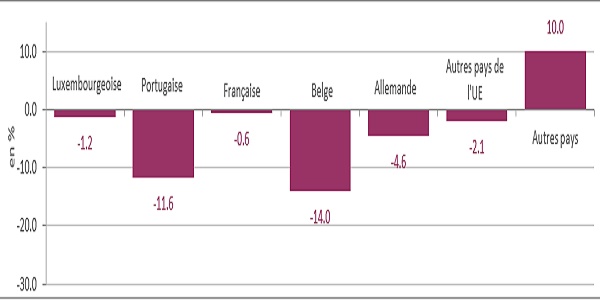
The number of females smoking whilst pregnant in Luxembourg has decreased, according to the recent triennial report "Surveillance of perinatal health in Luxembourg: Report on births 2014-2015-2016 and their evolution".
The Ministry of Health and the Luxembourg Institute of Health (LIH) have presented the 2019 edition of the report on birth surveillance in Luxembourg. This triennial report analyses the health of mothers and children in Luxembourg and their evolution from 2014 to 2016.
As a public health priority, the health of mothers and children is regularly monitored to identify, based on perinatal health indicators, positive developments and problem situations that require informed decision in the field of public health. The perinatal health surveillance system in Luxembourg is unique in Europe because it is based on a comprehensive data collection system installed in all the maternity hospitals of the country.
In the Grand Duchy, the surveillance of pregnant women is deemed excellent: 99.7% of women are followed by a health professional during their pregnancy and more than 90% consult a doctor in the first trimester of pregnancy.
For the first time in the existence of the registry (since 2009), the number of deliveries decreased by 2.2% during the observed period (2014-2016). Nevertheless, in parallel with the relative increase in the resident population of 4.8% on average over the 3 years studied, there has been an increase in the number of non-residents giving birth in Luxembourg for many years.
The number of multiple births has similarly increased to reach 22.2% (per thousand) of the total number of births for the period 2014-2016, which places Luxembourg as one of the countries with the highest rate of multiple pregnancies.
Moreover, between 2014 and 2016, 13.4% of women reported smoking daily or occasionally during the first trimester of pregnancy. There is also a decrease in the number of female smokers between the first and third trimesters of pregnancy: in total, more than one in five women stopped smoking between the first and third trimesters. However, there is the possibility of an under-reporting bias. Very few women (0.2%) reported using alcohol or other psychoactive substances on a daily basis during pregnancy. This trend can also be explained by the "0% alcohol during pregnancy" campaign launched by the Ministry of Health.
In Luxembourg, the rate of caesareans is higher than 30%. This rate reached 32.2% in 2014, 31.7% in 2015 and 32.2% in 2016. At the international level, the increase in caesarean section rate is a major public health topic in perinatal health. In Luxembourg, a working group composed of gynecologists-obstetricians, pediatricians-neonatologists and midwives, drew up, in 2014, national recommendations on the indications for a planned cesarean section. An impact assessment of these recommendations is underway. An information leaflet on caesareans was also produced by the Ministry of Health and made available to prospective parents in December 2014.








